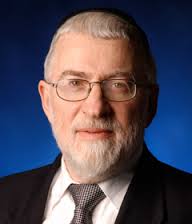Rabbi Hershel Schachter
Rabbi Hershel Schachter records that his teacher, Rabbi Joseph B. Soloveitchik once mentioned that the Satmar Rebbe asked in his sefer: who permitted the Zionists to offer so many sacrifices of Jewish lives for the sake of creating the State and maintaining it? Shouldn’t the danger to life have superceded the whole idea of the State, even if it had been a very great mitzvah? Rabbi Soloveitchik said that seemingly, this is a very strong argument. But he answered it based on his grandfather Reb Chaim Brisker's opinion that saving a Jew from apostasy has the same status in halacha as saving a Jewish life (in contrast to the opinion of the Shulchan Aruch, Orach Chaim 306:10 that the reason one may violate Shabbos to save his daughter from apostasy is only because of the principle of “sin so that someone else should not sin”.) Reb Chaim also held that a person is obligated to enter a situation of possible danger in order to save another person from a definite danger (in contrast to the ruling of the Mishnah Berurah, end of 329). Assimilation, in this context, is like apostasy, for assimilated Jews violate the entire Torah. Were the Jewish State to cease to exist, assimilation in America and Europe would increase by a large factor, for only through the State do the Jews in this period (after the Holocaust) have pride. So the individuals who sacrifice their lives in Eretz Yisroel are putting themselves in possible danger to save the multitude from a definite danger."
Rabbi Soloveitchik went on to say, however, that it is only when the entire existence of the state is at stake that it is obligatory to sacrifice lives to keep it in existence. If it is only a question of returning a piece of land in exchange for peace, the state is obligated to return the land, because the danger to the lives of Jews in Eretz Yisroel supercedes the mitzvah of conquering the Land. This, he said, is against the view of the Minchas Chinuch 425, who says that since the Torah commands us to conquer Eretz Yisroel from the Canaanites, and war by its nature involves some casualties, it must be that the mitzvah was given explicitly with the provision that it overrides Jewish lives. Rabbi Soloveitchik argued that Yehoshua's wars were an exception, since they were commanded directly by Hashem, but at all later times perhaps the Torah only permits conquest and defense of territory when there is some danger to Jewish lives, however remote. (Nefesh Harav, pp. 97-98)
In a 1988 article, Rabbi Schachter goes a step beyond his teacher's views, and says that even giving back land to save lives is not obligatory. First of all, he says, the Minchas Chinuch holds this way. Secondly, we can prove that any war to defend land, even when lives are not at stake, is a mitzvah war. For if it is only an optional war, how do the nations of the world have the right to defend their countries against an attacking army? They have no Sanhedrin that could grant permission for an optional war. So a war to defend territory is a mitzvah war, and by this logic Jews can do it too, even at the expense of lives.
He goes on to explain the reason why, in his view, defending a piece of land is more important than saving lives: "Since Eretz Yisroel is vital to Jewish existence as a nation-state, conquest by a foreign power is considered a lethal blow to the conquered nation. Therefore, just as a doctor may amputate a patient's limb in order to save the patient's life, where the life of an entire nation is in danger it is permissible to sacrifice the lives of the few for the purpose of sparing the nation at large."
However, he says, this would only be true if the Israeli-Arab conflict were a winnable conflict. Then we would put land above lives. But if it were a losing battle, similar to the war against the Romans at the time of the destruction of the Temple, then we would advocate surrender as did Rabbi Yochanan ben Zakai. And if it becomes clear that the conflict is neither clearly winnable nor clearly a losing battle, then it is up to the Israeli people themselves to decide if it is worth the sacrifice to hold onto the land. (Journal of Halacha and Contemporary Society, Fall 1988)
Rabbi Schachter goes even further and says that it is forbidden to pray for peace in Eretz Yisroel, because the Israeli-Arab wars are the “beginning of the redemption” and if there is peace, it will delay the redemption. As his source for this he cites a responsum of the Minchas Elazar (4:5) written during World War I, in which the Minchas Elazar understood that World War I was the being of the redemption and we should therefore not pray for peace, only for the redemption. Obviously, that would not apply here, because war waged by a Jewish state during exile is an obstacle to the redemption, not a vehicle to bring it closer. This is what the Gemara says in Sanhedrin 98a: that moshiach will not come as long as the Jewish people has a sovereign state.
